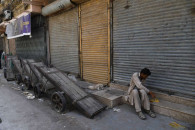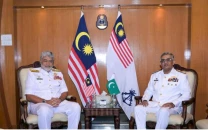Cultural diversity: In a globalised, terrorised world
Experts cite economic disparity, extremism as the main challenges to indigenous cultures.

Cultural diversity: In a globalised, terrorised world
The world day for Cultural Diversity for Dialogue and Development observed on May 21 comes at a crucial time for Pakistan. Some key questions are being raised, particularly on the impact of diversity on our current socio-political setting and whether cultural multiplicity can offer a solution for extremism and fundamentalism.
According to Aziz Ali Dad, a young intellectual and columnist, Pakistan’s cultural challenges are two-fold in nature. “We are exposed to two challenges — fundamentalism and globalisation,” said Aziz. He thinks that both are turning our own cultural diversity into a monolithic whole. “Celebrating cultural diversity and opening up to dialogue is crucial for gaining important insights into Pakistani culture — that it isn’t static,” he maintained. He pointed out that global media onslought coupled with the scourge of fundamentalism prioritises Pakistan’s unstable militant culture and in a sense, robs the country of its human agency.
Social scientist and writer Ashfaq Salim Mirza urged a better understanding of the term “cultural diversity” as it applies specifically to Pakistan. “People aren’t fully comprehending what cultural diversity is in Pakistan,” said Mirza. “Economic disparity affects culture; it gives rise to a variety of cultural norms and traditions that rely on their particular socio-economic milieu.” Mirza points out that women in Thar, Sindh go against normative gender perspectives by actively participating in the work force. These women are not bound or tied to their homes and as Mirza explains, travel for miles in search of water, fruit and sustenance. “Yet, we don’t see such examples on Pakistani tourism brochures or even in popular imagination. Nobody is looking at this side of Pakistan,” he added.
By this logic, it can be deduced that subversive groups, fundamentalists and extremists, have formed cultures reliant on their own political and economic moorings. These groups, experts argue, did not suddenly appear from an “unknown world” and their formation did not come out of a draconic desire to solely harm and terrorise. These complex sub-cultures are a creation of context and circumstance and therefore they cannot be “demonised”, said a journalist.
On the other hand, the onslaught of globalisation has endangered local cultures, where changed social settings have also led to increased confusion and animosity among people. “The cause of global harmony remains precariously poised. Global economic activity and advances in communications both illustrate humanity’s growing inter-connectedness, yet barriers, mistrust and animosity persist between people and cultures,” said Ban Ki Moon, UN Secretary General, in his message for Cultural Diversity Day 2011. He pointed out that there “is no sweet without the sting” and that celebrating cultural difference could also result in “spiritual, social and economic wealth”. However, Moon suggested that a solid and unified culture may do wonders for inter-connectedness and moving towards global tolerance.
Published in The Express Tribune, May 21st, 2011.



















COMMENTS
Comments are moderated and generally will be posted if they are on-topic and not abusive.
For more information, please see our Comments FAQ